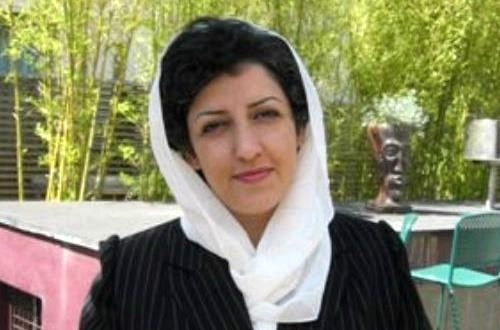Een brief van Narges Mohammadi
 Begin mei vroegen we de PEN-leden in de “Sirenemail” een email of kaartje te sturen aan de Iraanse journaliste Narges Mohammadi, die in Iran in de gevangenis zit. Hieronder haar brief aan de internationale PEN-gemeenschap, geschreven vanuit de Evin gevangenis. De brief werd ontvangen door PEN Denemarken, waar Mohammadi erelid is, en is gericht aan de hele internationale PEN-gemeenschap, dus ook de Nederlandse leden die haar een bericht hebben gestuurd of zich voor haar hebben ingezet.
Begin mei vroegen we de PEN-leden in de “Sirenemail” een email of kaartje te sturen aan de Iraanse journaliste Narges Mohammadi, die in Iran in de gevangenis zit. Hieronder haar brief aan de internationale PEN-gemeenschap, geschreven vanuit de Evin gevangenis. De brief werd ontvangen door PEN Denemarken, waar Mohammadi erelid is, en is gericht aan de hele internationale PEN-gemeenschap, dus ook de Nederlandse leden die haar een bericht hebben gestuurd of zich voor haar hebben ingezet.
Op 20 april stond Mohammadi voor de rechter, op 17 mei is haar advocaat op de hoogte gebracht van het vonnis. Op het moment van schrijven is dit vonnis nog niet bekend.
In haar brief roept Narges Mohammadi de PEN-gemeenschap op om te protesteren tegen eenzame opsluiting als een vorm van psychologische marteling en een inhumane straf.
Dear members of International PEN,
I’m writing this letter to you from the Evin Prison. I am in a section with 25 other female political prisoners, with different intellectual and political point of view. Until now 23 of us, have been sentenced to a total of 177 years in prison (2 others have not been sentenced yet). We are all charged due to our political and religious tendency and none of us are terrorists.
The reason to write these lines is, to tell you that the pain and suffering in the Evin Prison is beyond tolerance. Opposite other prisons in Iran, there is no access to telephone in Evin Prison. Except for a weekly visit, we have no contact to the outside. All visits takes place behind double glass and only connected through a phone. We are allowed to have a visit from our family members only once a month.
But it is the solitary confinement, which is beyond any kind of acceptable imprisonment. We – 25 women – have detained in total more than 12 years in solitary confinement. Political prisoners who are considered dangerous terrorists are held in solitary confinement indefinitely. Retention in solitary confinement can vary from a day up to several years.
However, according to regulations of the Islamic Republic of Iran, holding prisoners in solitary confinement is illegal. Unfortunately until now, the solitary confinement, as a psychological torture, has had many victims in Iran.
During 14 years long activity of the Center for Human Rights Defenders, the Center have published and held many protests against the use of this kind of punishment. But unfortunately the solitary confinement is still used against many of Iran’s political prisoners. The solitary confinement is used to get forced and false confessions out of the defendants. These false and faked confessions are used against the defendants during the trials. Many of the detainees in the solitary confinement are suffering from mental and physical health problems and the injuries will remain with them for the rest of their life. As a matter of a fact, the solitary confinement is nothing but a closed and dark room. A dimly confined space, deprived of all sounds and all light that can give the inmates a sense of humanity. Personally, I have been in solitary confinement three times since 2001. Once during my interrogation in 2010, I suffered a panic neurotic attacks, which I had never experienced before.
As a defender of human Right, who has experienced and have had dialogues with many people detained in solitary confinement, I emphasize that this kind of punishment is inhuman and can be considered psychological torture.
As a humble member of this prestigious organization, I urge all of you, as writers and defenders of the principles of free thought and freedom of speech and expression, to combat the use of solitary confinement as torture, with your pen, speech and all other means. Maybe one day we will be able to close the doors behind us to solitary confinement and no one will be sentenced to prison for criticizing and demanding reforms. I hope that day will come soon.
Greetings and Regards
Narges Mohammadi
Prison Evin, May 2016





